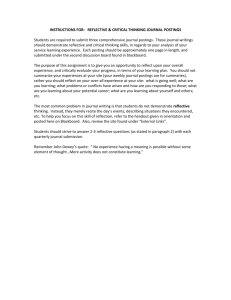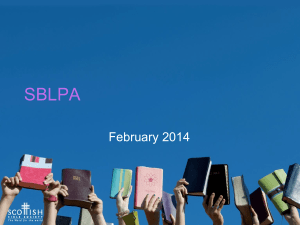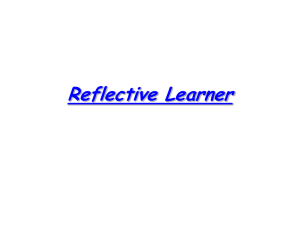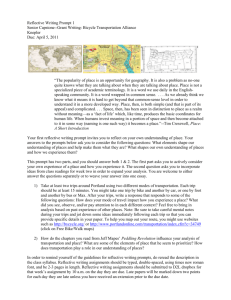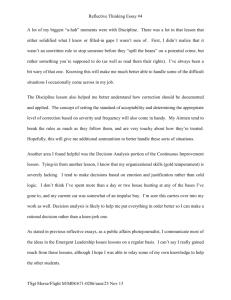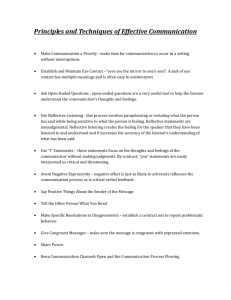Teachers: Technicians or Professionals?
advertisement
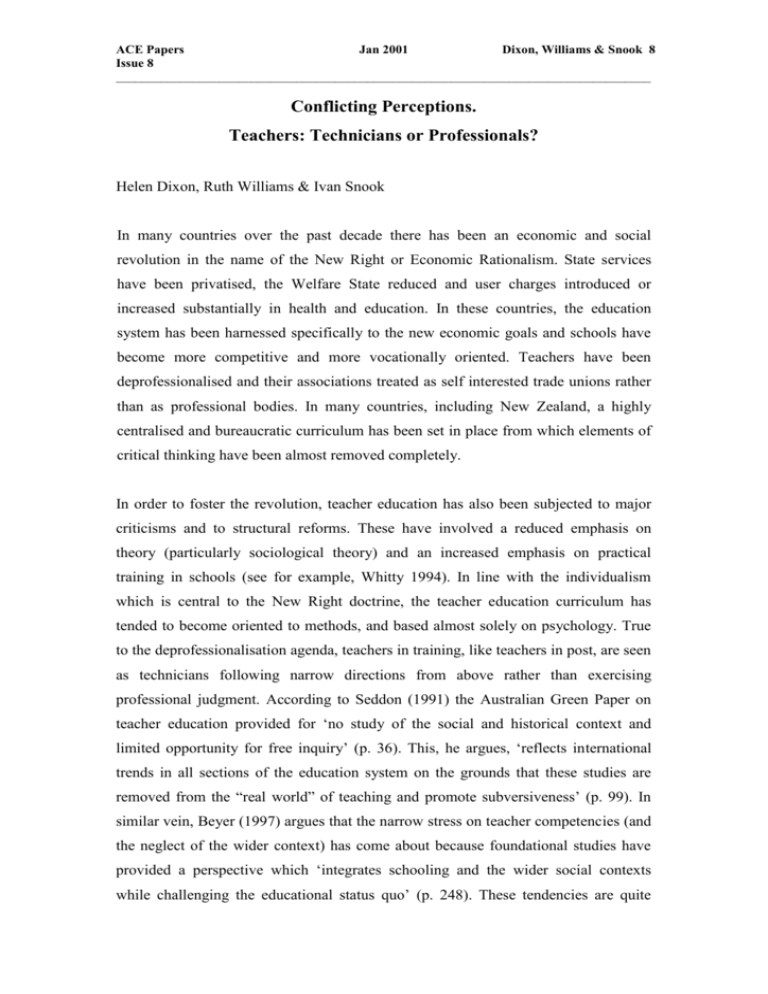
ACE Papers Jan 2001 Dixon, Williams & Snook 8 Issue 8 ___________________________________________________________________________________ Conflicting Perceptions. Teachers: Technicians or Professionals? Helen Dixon, Ruth Williams & Ivan Snook In many countries over the past decade there has been an economic and social revolution in the name of the New Right or Economic Rationalism. State services have been privatised, the Welfare State reduced and user charges introduced or increased substantially in health and education. In these countries, the education system has been harnessed specifically to the new economic goals and schools have become more competitive and more vocationally oriented. Teachers have been deprofessionalised and their associations treated as self interested trade unions rather than as professional bodies. In many countries, including New Zealand, a highly centralised and bureaucratic curriculum has been set in place from which elements of critical thinking have been almost removed completely. In order to foster the revolution, teacher education has also been subjected to major criticisms and to structural reforms. These have involved a reduced emphasis on theory (particularly sociological theory) and an increased emphasis on practical training in schools (see for example, Whitty 1994). In line with the individualism which is central to the New Right doctrine, the teacher education curriculum has tended to become oriented to methods, and based almost solely on psychology. True to the deprofessionalisation agenda, teachers in training, like teachers in post, are seen as technicians following narrow directions from above rather than exercising professional judgment. According to Seddon (1991) the Australian Green Paper on teacher education provided for ‘no study of the social and historical context and limited opportunity for free inquiry’ (p. 36). This, he argues, ‘reflects international trends in all sections of the education system on the grounds that these studies are removed from the “real world” of teaching and promote subversiveness’ (p. 99). In similar vein, Beyer (1997) argues that the narrow stress on teacher competencies (and the neglect of the wider context) has come about because foundational studies have provided a perspective which ‘integrates schooling and the wider social contexts while challenging the educational status quo’ (p. 248). These tendencies are quite 9 Dixon, Williams & Snook Jan 2001 ACE Papers Issue 8 ___________________________________________________________________________________ evident in New Zealand programmes of teacher education, and over the past three or four years the 'dumbing down' of teacher education programmes has intensified. The authors of this paper are committed to the view that teaching is a profession which requires a sophisticated integration of in-depth study of theory and sustained practice. They are also committed to the importance of contextual studies which set schooling in broader contexts: these include major philosophical ideas, social and educational history, and sociology. They believe that a professional teacher requires abstract understanding of the enormously complex task of teaching and not simply techniques for carrying it out. In previous papers one of the authors (Snook 1993, 1998, 2000) set out four arguments for the importance of contextual studies. Briefly these were: 1. The problems which teachers face are multi-faceted and require many forms of understanding for their conceptualising and solving. 2. The reflective teacher, to whom almost universal lip service is paid, requires a knowledge of the many critical disciplines which make true reflection possible. 3. Contextual studies are needed to balance the bias which comes in with the presuppositions of any discipline including psychology (and, of course, sociology and philosophy!). The student needs to see that there are many different ways of viewing a teaching situation. 4. A professional should not only be a good practitioner but a source of informed advice on issues of policy and provision. In the first part of this paper we examine some of the meanings of ‘reflective teaching’ partly because it is so widely accepted and partly because we believe it is often erroneously understood. We will then broaden the discussion by drawing on the literature of contextual studies and their importance. ACE Papers Jan 2001 Dixon, Williams & Snook 10 Issue 8 ___________________________________________________________________________________ In the second part of the paper we set out the rationale for the new degree at Auckland College of Education. In this degree the contextual and critical elements were made central but, unlike traditional programmes, are not presented as separate courses (e.g. on educational sociology) but integrated into all topics in Education and in Professional Inquiry and Practice. In the third part we present some data from surveys of pre-service students and teachers who are upgrading their diploma. In the light of these data we will have something to say about the frequent claim that students do not like these studies and find them irrelevant to their work in schools. We will note that suggested new criteria for licensing teachers in the United States, fully concur with the points we make about the importance of contextual studies. Finally we will make some suggestions about the significance of our findings for teacher education [in New Zealand]. The Reflective Teacher Over the past decade, there have been an increasing number of calls by teacher educators, for an emphasis on reflection and the development of reflective practitioners (Pollard, 1987, Smyth, 1989, Valli, 1992, Zeichner & Liston, 1990). Earlier, Schon (1987) argued that any professional education should be aimed at enhancing the practitioner's ability to reflect-in-action and develop a capacity for continued learning as a preparation for handling the complex and unpredictable problems of actual practice. The idea of reflective thinking can be traced back to Dewey (1910) who focused on inquiry as being the essence of reflective experience which is in turn characterised by a willingness to sustain doubt and perplexity, while engaging in the development of tentative hypotheses. The notion of the reflective teacher has not been without its problems and confusions. Zeichner & Liston (1990) set out four main varieties of reflective teaching and they themselves added a fifth. Tabachnick & Zeichner (1991) warned that none of the models is sufficient in itself to provide a moral base for teacher education. Smyth (1989, 1993) has challenged the individualist basis of much of the talk of reflective teaching. He argues that merely individual reflection does not empower teachers and 11 Dixon, Williams & Snook Jan 2001 ACE Papers Issue 8 ___________________________________________________________________________________ serves to divert attention away from the social, economic, and political dimensions of the tasks they face. In our terms, the recent ‘confusions’ about reflective teachers are themselves explained by the deprofessionalising of teachers and the decontextualising of classroom activity referred to earlier in the paper. We believe strongly that this domestication of a critical concept to refer solely to a psychological 'act' is a calculated ideological move to ensure that teachers are merely technicians who are divorced from the social world in which they have to operate. In this way, as Seddon says, ‘reflection’ is ‘nothing more than a slogan which comfortably justifies whatever we do’ (1991: 101). Ironically, those trained to be ‘reflective’ in this limited way will be among the least reflective and self-critical teachers (‘Don't bother me with all that “theory”; I just want to get on with the job’). We need to remind ourselves that teacher education is not concerned with the production of a thinking, inquiring, reflective person but with the development of a thinking, inquiring, and reflective teacher. The task of developing thinking professionals has to be related closely to the nature of the particular profession. The reflective doctor, the reflective lawyer, and the reflective teacher will have some characteristics in common but there will be important differences. A reflective practitioner needs to reflect on all the matters that are relevant to the activities that she/he is called on to perform. One of the reasons that many students in training for all professions regard much of their education as irrelevant is that they have a limited view of what is required. Those who design their courses normally have a broader view. In particular, they realise the importance of ‘the interpretive’ studies: those which are not directly applied in practice but which enable the practitioner to conceptualise the task, analyse the problems, and work towards possible solutions. The problems faced by teachers are never solely related to the individual learner's motivation, ability or stage of development. A person's motivation for example, is tied up with social class, parental aspirations, cultural norms and individual and group history. ‘Special needs’ do not arise just from emotional, cognitive or physical disabilities. Children often have special needs because of the type of home they live ACE Papers Jan 2001 Dixon, Williams & Snook 12 Issue 8 ___________________________________________________________________________________ in, the relationships between their parents, the style of home life lived and the cultural and social background from which they come. In New Zealand, teacher educators have (slowly) come to see this in relation to the Maori and Pacific Islander but the point must be taken beyond that. Every child comes from a culture; every child has a social milieu; every child is embedded in the socio economic and political order. It seems very clear to us, therefore, that defensible teacher education must involve the wider contextual studies that locate teaching in its social environment and provide teachers with the intellectual tools for analysing and solving the problems of practice. It can be argued that pre-service teacher education cannot cope with all that professionals require; there is, after all, post graduate and 'lifelong' learning. This point is undoubtedly correct but we believe that this supports rather than undermines our position. Of course an initial period of training cannot cover everything, and it is therefore very important to provide cognitive maps for understanding and attitudinal traits which will serve the student for a lifetime. A narrow technicist first degree prepares students for the first year of teaching (and that is how it is often defended ‘these kids have to face the classroom next year’!). A broad, general, problem-centred and contextual first degree provides (a) the motivation (there is much more to be known) and (b) the knowledge (this is how to advance one's knowledge) for a student to seek further education in relevant areas. In the 1960s teachers used to rather facetiously distinguish between ‘ten years of teaching experience’ and ‘one year of teaching experience carried out ten times’. Broad critical work prepares for the former. A narrow technicist training encourages the latter. There is much support in the literature for the importance of contextual studies if teacher education programmes are to produce teachers who are both effective classroom teachers and reflective practitioners. The argument is a powerful one that the various academic disciplines provide us with potent intellectual tools with which to study teaching and learning. Indeed there is a body of literature which contends that it is impossible to solve an educational dilemma without the disciplines of history, psychology, sociology and philosophy. Each discipline having the potential to make a significant contribution to our understanding of educational issues and to inform the decisions made by teachers (Ball, 1996, Goodson, 1997, Groundwater- 13 Dixon, Williams & Snook Jan 2001 ACE Papers Issue 8 ___________________________________________________________________________________ Smith, Cusworth & Dobbins, 1998). Groundwater-Smith et al (1998) provide an illustration of how knowledge and understanding of each of the disciplines contribute to an understanding of educational issues. They use the example of catering for the needs of 'gifted' children. They argue that a knowledge and understanding of philosophy might assist the ways in which giftedness is defined; psychology might assist in the assessment of giftedness; sociology would help inform teachers on questions of equity and whether or not conceptions of giftedness benefit some groups at the expense of others, while history would inform about the provision of gifted education. Hatton (1998) has expanded this argument further when she contends that the overall quality of education will not improve without teachers who have a broad theoretical understanding of teaching (about its complexities, dilemmas and contradictions). This, she argues, includes critical reflection of policy, practice and curricula, a view which is shared by Pollard & Tann (1997). They have asserted that while teachers have a responsibility for translating policy into practice, teachers should speak out, if they view particular aims and policies as being ‘professionally impracticable, educationally unsound or morally questionable’ (p. 13). Goodson (1997) has gone as far as to contend that the 'parlous' condition of education in Britain is the result of conscious efforts to exclude informed theory or research study. He believes that theoretical bodies of knowledge as well as action research studies and reflective practice are all ways of taking practice defined by others and as a result, developing teacher professionalism. He argues further that it is inconceivable of governments, who are serious about effective and efficient education, to make policy that ignores theoretical expertise. Snook, in a previous paper (1993), has argued that in order to improve teaching and teacher education we need more professionalism not less; more theoretical training not less; educated teachers not skilled trainers. These claims, conceptual as they are, are not without empirical support (although there is a surprising lack of data on teachers' evaluations of their training). Birkel (1983, cited in Borman, 1990) examined the views of a 367 secondary teacher students in an American university on their experience of foundation studies. (The name given in USA to what we are calling the contextual studies.) They valued them ACE Papers Jan 2001 Dixon, Williams & Snook 14 Issue 8 ___________________________________________________________________________________ quite highly with some 70% saying that there was much value in the discussion of social classes, school integration and equality of opportunity. Dawson, Mazurek, and De Young (1984, cited in Borman, 1990) studied 615 education students in two large American universities. Approximately two thirds agreed that foundation courses (sociology, history, and philosophy) were very helpful and ‘valuable for all teachers’. Borman (1990) having cited these studies adds that there is further evidence from AESA (American Education Students Association) meetings where consistently ‘these courses are highly rated by students especially when their content highlights current social issues and sociological concepts’ (p. 395). On the other hand many of the skill based and ‘methods' courses, which many see as self evidently relevant, are not without their problems. Reviewing all the extant research on teacher education in 1986, Lanier & Little (1986) lamented that: ‘The obsession with technique and management continues even though its shortcomings have long been recognised’ (p.53). More recently, Needels (1991) carried out a small piece of research on first year teachers and as a consequence points out that 'observation' of classroom practice may be of little use. What is needed, she argues, is that the teacher educator ‘concentrate on helping novice teachers to understand the complexity of teaching and the relationship between the elements of it ... this approach would move away from an approach to teacher education that emphasises specific skills or performance objectives’ (p. 278). Later in the paper we will present findings from surveys of students at ACE (both preservice and experienced teachers) who are involved in a degree programme which has been consciously designed in accordance with the general philosophy outlined so far in this paper. The Philosophy Underpinning the Bachelor of Education (Teaching) Degree The Auckland College of Education's Bachelor of Education (Teaching) degree is a professional degree underpinned by the notion of reflection; the degree accreditation proposal emphasising the pivotal role of reflection as the ‘central and integrating feature’ (ACE 1996: 6) of the programme. The degree programme aims to produce beginning teachers who are reflective practitioners able to reflect upon ethical, social, 15 Dixon, Williams & Snook Jan 2001 ACE Papers Issue 8 ___________________________________________________________________________________ political and pedagogical issues associated with their professional practice. As a consequence of a commitment to producing beginning teachers who are able to understand and acknowledge the broader purposes of education and the contexts in which their professional practice is embedded, considerable importance was placed on the model of reflection introduced to, and practised by, student teachers. It was considered critical that it encompassed more than merely the ability to reflect on classroom teaching practice. That a framework which takes into account ‘the wider social and political contexts within which teachers work’ (p.8) as well as facilitating the examination of ‘moral and political issues implicit in teaching practices’ (p.8) be used. As a result, the particular perspectives on reflection and reflective practice taken in the degree programme were those based on critical theory. Students enrolled in the Bachelor of Education (Teaching) at the Auckland College of Education are required over a three year period to complete four compulsory courses in both Education and Professional Inquiry. During the planning stages of these courses it was intended that similar notions underpinned their development: critical theory in Education and a framework for reflective practice based on critical theory in Professional Inquiry. Subsequently, staff in the two centres (departments) worked together closely to ensure that the material presented would have planned links that could assist students in their understanding of teaching and learning from both micro and macro perspectives. The introductory Education course examined relevant theoretical perspectives (philosophical, historical, psychological and sociological), and their relevance to the study of development and learning. At the same time, the Professional Inquiry course introduced the notion of reflective practice through linking the process of reflection to the role of the teacher as a professional. During subsequent courses sociopolitical factors which affect teachers' work were investigated in some detail. In the final education course theory and discourse surrounding educational policy making in New Zealand were examined in greater depth. Through the processes of analysing and critiquing, students were expected to develop a deeper understanding of educational policy making and its outcomes. ACE Papers Jan 2001 Dixon, Williams & Snook 16 Issue 8 ___________________________________________________________________________________ Presentation and Discussion of Student Surveys Aware that many of the critics of current teacher education programmes have condemned courses which emphasise the theoretical, rather than the practical, as extraneous and spurious for student teachers (Seddon, 1991, Whitty, 1994), it was deemed important that student teachers themselves should be allowed to comment on the relevancy and appropriateness of such courses. Midway through their first year of study, student teachers were required to complete a substantial mid point course evaluation. One of the intentions of this evaluation was to establish student perceptions of the ways in which the Education and Professional inquiry courses had contributed to students' understanding of curriculum content and to their practicum experience. Following their final Education course, which student teachers completed in the second to last semester of their programme, another evaluation was undertaken. Again students were required to comment on the importance of the course content to their understanding of teaching. At the time of the first evaluation written responses were gained from 365 students all of whom were preservice undergraduates. By the time the second evaluation was undertaken the degree programme had been expanded to include eighty practising teachers who were upgrading their qualification from a diploma to degree. These teachers are included within the 370 students who completed the second evaluation. First Year Evaluation 91% of the first year students surveyed perceived the content covered in the Education course to be of great importance in their development as a teacher. The examples they gave to illustrate Education's significance ranged across all curriculum areas. Not surprisingly, after only a semester in the programme, most comments were general in nature. They do however highlight students' developing awareness of the relationship between the theory learned in Education and the application of this in specific curriculum areas. Comments such as these were not unusual: The use of education vocab was very useful in a lot of other subjects; The theories of education give you a great base; 17 Dixon, Williams & Snook Jan 2001 ACE Papers Issue 8 ___________________________________________________________________________________ [Education] ties into other courses, eg gender and cultural influences on teaching and learning; I have been able to relate other work into topics learned in Education, gained deeper insights. The sociological component of all Education courses is based loosely on critical theory with Smyth's (1993) framework for reflective practice promoted in Professional Inquiry. In analysing student responses an awareness of equity issues was highlighted and a questioning of their own beliefs and assumptions was indicated. Students raised questions related to ‘why we do what we do in educational settings’. These were tied to the notion of socially constructed and culturally bound phenomena and included such examples as: In PI [Professional Inquiry] I understood the need for reflection; [Education and Professional Inquiry] broadened my understanding; [Educational theory is] underlying to all areas. Without this knowledge and self questioning we would maintain a very bigoted industry; [Education] has given me a background of how and why education is taught today and how I can improve on that; [Educational theory] helps me make sense of why and how things are; [Educational theory] shows the social and political environment which influences the curriculum.. ACE Papers Jan 2001 Dixon, Williams & Snook 18 Issue 8 ___________________________________________________________________________________ 9% of student teachers stated that the Education course had not contributed to their understanding of work covered in other courses. These students considered that there were few or no links that they were aware of, and that Education seemed to be a subject on its own and was more theoretically based than other curriculum courses as such comments exemplified: [Education] seems to be a subject on its own and I haven’t established any links to date; I felt that all the curriculum areas cross over but education does not. However, some of these students suggested that they might see links between courses when they gained more understanding of how they related to each other: Education so far has been theoretical while other courses are more practical, they have yet to overlap although I’m sure they will; Up until now we have been scratching the surface in all curriculum areas. Now we have a basic concept, things should come together. Significantly, rather than perceiving that the content taught in Education was irrelevant to the practical aspects of their teacher education programme, 79.4% of students stated that the material covered in Education linked to and/or assisted them in their first practicum experience. When asked why this was so it was evident that students had found that both the psychological and sociological components of the course beneficial to their understanding of practicum. From a psychological perspective students believed that content related to child development, and their learning had assisted them to make more sense of their initial practicum experience. Comments such as these were common: My expectations of students learning abilities were shaped well by the education paper; 19 Dixon, Williams & Snook Jan 2001 ACE Papers Issue 8 ___________________________________________________________________________________ [Theories of child development] helped me understand children more; [Theories of child development gave me an] awareness of children's differences; I learned more about the developing child which I extended during Practicum. Even after a short time in their teacher education programme, many students were cognizant of factors such as gender, ethnicity and social class that could influence learning. Students were also aware of the reproduction of inequalities and they recognised how schools/early childhood centres might overcome such inequalities. This was reflected in these comments: [An introduction to sociological theory] gave me the background to question educational processes; [Education has made me] aware of social construction, history, experience; I can see how socio economic structures have impacted on the dynamics of teachers; [An introduction to sociological theory] has given me an understanding of children in a wider context; It actually makes me angry to see structures still being used which maintain inequalities in education. Twenty percent of students did not consider Education linked or assisted with their Practicum experience. Some students considered there were few links while others perceived their Practicum did not give them the opportunity to make links because of the limited time on Practicum (two weeks). A minority of students emphasised that ACE Papers Jan 2001 Dixon, Williams & Snook 20 Issue 8 ___________________________________________________________________________________ there seemed to be a lack of application of relevant theories to classroom/centre practice, as these students explained: None of it is relevant; I have very little link up yet; Education is not really relevant when in the classroom but is definitely important in growth as a teacher; I feel I would need longer time in the classroom to make links with education; [It is] too early into teaching to understand and make links to it; Practicum I found very discouraging, the ideas and ideals in theory weren’t really being used. Third Year Evaluation The fourth and final (compulsory) education course that students must complete is a course entitled Education Policy Studies in Aotearoa. Students complete this in the second to last semester of their programme. The focus of this course is the social, economic and political forces that have shaped both the historical and the contemporary educational policy within New Zealand. Divided into three themes the course examines the interaction between global economic forces and New Zealand educational policy, the ideological nature of discourse and its relationship to policy development and finally, specific policy implementation and its effects on teachers' practice. At the end of this course students completed the second evaluation. Of interest to the course developers were students perceptions of the relevancy of such a course to their understanding of teaching. Did students consider a course that had as its focus the macro issues surrounding education important, as opposed to courses centred on the classroom and meeting children's needs? Students responded in the affirmative with 90.5% indicating that the course content had increased their understanding of teaching. Goodson (1997) has argued strongly 21 Dixon, Williams & Snook Jan 2001 ACE Papers Issue 8 ___________________________________________________________________________________ that theoretical bodies of knowledge must underpin teacher education programmes. Interestingly, this was an area that students themselves commented upon when asked to identify the ways in which their understanding of teaching had changed. They believed that their knowledge of politics, history, schools and society had increased significantly. This was true for the student teachers enrolled in the course as reflected in these quotes: [Understanding of history, politics and economics] provided me with background knowledge and a philosophy content; The politics of education, a historical perspective how education stands in government terms has given me a theoretical base and knowledge; Education links to all other areas of learning as it forms the basis of informed practice; Awareness of policy in education, awareness of the political system and how it impacts on teachers and schools [has informed my practice]. The practising teachers who were upgrading their qualifications commented: I have become familiar with the history of education and the external factors that influence our profession. The political issues and economic features were interesting; Being able to academise my thinking and read policy using a dialectical approach [increased my understanding of teaching]; History made one understand some things and question others. Overwhelmingly, the practising teachers believed that these increased knowledge bases had provided them with the tools of analysis whereby they could better ACE Papers Jan 2001 Dixon, Williams & Snook 22 Issue 8 ___________________________________________________________________________________ articulate, defend, or challenge what was happening within the education system. These comments from teachers illustrate how knowledge of the wider political and economic contexts has helped them to understand the significant changes they had experienced in New Zealand in recent years: I have become informed on political issues that have helped me to understand the underlying issues surrounding schools - issues that I initially thought were useless - but now have absolute appreciation [of]; [Educational theory has given me] an appreciation of the WHY behind the WHAT of the extensive range of changes faced by teachers over the last ten years; This is one of the most fabulous papers [Policy Studies] I have ever undertaken, it has provided me with a firm base for all my babbling that I have been on about for years. The majority of students believed that this increased knowledge was worthwhile and would be beneficial to them. Comments such as these were commonplace: An understanding of policy, politics, ideology will assist us in our ability to effect change and to justify what we do and why; I know more about the [education] system and will be able to adapt my practice to support grounded theories rather than follow accepted practice with no understanding of why; Hatton (1998) has argued that the overall quality of education will not improve unless teachers have a deep understanding of the complexities, contradictions and dilemmas inherent in the act of teaching. A number of the statements made by the student teachers showed that their notion of teaching had broadened. They viewed this broadening conception of teaching in a positive manner and remarked thus: 23 Dixon, Williams & Snook Jan 2001 ACE Papers Issue 8 ___________________________________________________________________________________ Teaching is a much wider, and political issue than I originally thought it was; Politics has so much control and influence over teaching, teaching is not as simple as I had once thought; [Policy Studies] made me understand teaching is not just teaching, there is to think about, more philosophical ideas about the nature of teaching; and felt that this could only improve their practice as beginning teachers. For many students the notions of agency and professionalism were empowering. They believed that they had developed the ability to reflect critically both on their own practice and on wider educational contexts which the comments of these student teachers reflect: [Policy Studies] makes you see how and why teachers feel the way they do and enables you to make informed decisions about current issues and the ways in which you can work to make positive changes; I know more about the system and will be able to adapt my practice ... rather than follow accepted practice with no understanding of why; Now I look carefully at all curriculum areas and realise how these are insisted upon by the government. Education has given me the theoretical base to challenge why I teach the way I do. The practising teachers also remarked on this: [Educational theory] is making me think more about why I do what I do and my own beliefs about education; I've learned to reflect and look at my own philosophies, professionalism, pedagogy. My philosophy of teaching and learning has gotten wider; ACE Papers Jan 2001 Dixon, Williams & Snook 24 Issue 8 ___________________________________________________________________________________ [I am now] critiquing my own practice and assumptions, this has been ongoing this semester. They too felt more empowered to question and challenge what was currently happening in education as is illustrated by their comments: [Policy Studies has] empowered me in dealing with my Board of Trustees; [Policy Studies] has really made me question issues ... I have found myself expressing views to other staff members; [Policy Studies] encourages greater depth of knowledge and questioning of the present day system, there's not enough teacher knowledge or concern. Teacher Licensing in the USA We have been pleased to find support for the views we express and the data we present in the very recent and important book on teacher licensing in the United States. This book, by leading American researcher Linda Darling-Hammond and associates (1999), takes off from the innovative work of the Minnesota Board of Teaching (MBOT). They say: ‘Where others seek expedience, the MBOT ... has set a deliberate course to produce a licensing system which will encourage the development of professional teachers’ (p. ix). The book, however, extends that work and puts it in a wider context which the authors believe ‘will be crucial for ensuring that teachers have the knowledge they need to as a foundation for twenty first century schools’ (p. ix). Having compared and discussed various state mandated areas of necessary knowledge, as well as those produced by professional education bodies, the authors conclude that a common core of teaching knowledge exists that is widely recognised as important. These, they summarise as follows: 25 Dixon, Williams & Snook Jan 2001 ACE Papers Issue 8 ___________________________________________________________________________________ 1. Knowledge about learners and learning, including knowledge about human growth and development, motivation and behaviour, learning theory, learning differences, and cognitive psychology. 2. Knowledge about curriculum and teaching, including general and context-specific pedagogical knowledge, curriculum theory, assessment and evaluation, as well as knowledge of scientific inquiry, epistemology, communication and language as they relate to pedagogy. 3. Knowledge about contexts and foundations of education, including knowledge about schools and society, cultures, educational history and philosophy, principles from sociology and anthropology, legal responsibilities of teacher and ethics (p. 35-38). They conclude with these words: ‘Investing in knowledgeable and skilful teachers who are able and willing to do what is right for children is the only sure way to create successful education for all’ (p.167). Recommendation for Teacher Education in New Zealand 1. That teacher educators be aware that, contrary to much that is said in New Zealand teacher education, contextual studies can be highly relevant to educational practice. 2. That teacher educators note that, even in a concentrated three year programme, contextual studies can be developed provided that they are integrated with other studies. 3. That all teacher educators cooperate in developing a clear vision of qualities desired in a truly professional teacher and construct courses and activities that promote those qualities. 4. That the new Education Council begin its deliberations by a careful study of the book by Darling-Hammond and construct, in dialogue with the profession, ACE Papers Jan 2001 Dixon, Williams & Snook 26 Issue 8 ___________________________________________________________________________________ an account of the types of knowledge required by a professional teacher in Aotearoa/New Zealand. 5. That teacher educators work with the Council, the ministry and the government towards the development of an extended degree for teachers which allows for a fuller development of all aspects of professional teachers to meet current and future challenges. Comments welcome r.williams@ace.ac.nz h.dixon@ace.ac.nz References Alcorn, N. (1999). Initial teacher education since 1990: Funding and supply as determinants of policy and practice. New Zealand Journal of Educational Studies. Special issue: A decade of reform in New Zealand education. Where to now? 34(1), 110-120. Auckland College of Education. (ACE) (1996). Proposal for approval and accreditation of the Bachelor of Social Sciences (Teaching). Submission - Volume 1. Ball, S. (1996). Intellectuals or technicians? The urgent role of theory in educational studies. British Journal of Educational Studies, XXXXIII(3), 255-271. Beyer, L. E. (1997). The moral contours of teacher education. Journal of Education for Teaching, 48(4), 245-254. Beyer, L. E. (2000). Teacher education and the “new professionalism”: The case of the USA In A. Scott and J. Freeman Moir (eds), Tomorrow’s teachers: International and critical perspectives on teacher education. (pp 24-42). Christchurch: University of Canterbury Press. Borman, K. (1990). Foundations of education in teacher education. In W. Robert Houston (Ed.), Handbook of research on teacher education. (pp. 393-402). New York: Macmillan. Calderhead, J. (1993). The contribution of research on teachers' thinking to the professional development of teachers. In C. Day, J. Calderhead & P. Denilco (Eds.), Research on teacher thinking. London: Falmer Press. Darling-Hammond, L. (1999). Reshaping teacher policy, preparation and practice: Influences of the National Board for professional teaching standards. Washington, DC: American Association of Colleges for Teacher Education. Dewey, J. (1910). How we think.. Boston: D. C. Heath and Co Goodson, I. (1997). "Trendy theory" and teacher the professional development of teachers. In C. Day, J. Calderhead & P. Denilco (Eds.), Research on teacher thinking. London: Falmer Press. Goodson, I. (1997). "Trendy theory" and teacher professionalism. Cambridge Journal of Education, 27(l), 7-22. Groundwater-Smith, S., Cusworth, R., & Dobbins, (1998). Teaching: Challenges and dilemmas. Marrickville, NSW: Harcourt Brace. Hatton, E. (1998). Understanding Teaching (2nd ed.). London: Harcourt Brace & Co. Lanier, J. E. & Little, J. W. (1986). Research on teacher education In M. C. Witbrock (Ed.), Handbook of research on teaching (3rd ed.), (pp. 52-56) New York: Macmillan. Needels, M. C. (1991). Comparison of student, first year and experienced teachers' interpretations of a first grade lesson. Teaching and Teacher Education, 7(3), 269-278. Pollard, A. (1987). Reflective teaching: The sociological contribution. In P. Woods & A. Pollard (Eds.), Sociology and teaching: A new challenge for the sociology of education. (pp. 53-73). London: Croom Helm. Pollard, A. & Tann, S. (1997). Reflective teaching in the primary school: A handbook for the classroom (3rd ed.). London: Cassell. Schon , D. (1987). Educating the reflective practitioner: Towards a new design for teaching and learning in the professions. San Francisco: Jossey Bass. 27 Dixon, Williams & Snook Jan 2001 ACE Papers Issue 8 ___________________________________________________________________________________ Seddon, J. (1991). Contradictions in the Australian teacher education debate: implications for policy and practice. Journal of Educational Policy, 6(4), 359-369. Smyth, J. (1989). Developing and sustaining critical reflection in teacher education. Journal of Teacher Education, 40 (2), 2-9. Smyth, J. (1993). Reflective practice in teacher education and other professions. Keynote address to the Fifth National Practicum Conference, Sydney, 4 February. Snook, I. (1993). Teacher education: A sympathetic appraisal. Delta, 47, 19-30. Snook, I. (1998). Teacher education: Can it lead to a learned profession? Paper presented to the New Zealand Council for Teacher Education Conference, Hamilton. Snook, I, (2000a). Teacher education: Preparation for a learned profession? In A.Scott and J.FreemanMoir (eds), Tomorrow’s teachers: International and critical perspectives on teacher education. (pp.143-155). Christchurch: Canterbury University Press. Snook, I. (2000b). Foreword In P. Adams, J. Clark, J. Codd, A. O’Neill, R. Openshaw & H. WaitereAng (Eds.), Education and society in Aotearoa New Zealand. An introduction to the social and policy contexts of schooling and education. Palmerston Tabachnick B. R., & Zeichner, K. (Eds.). (1991). Issues and practices in inquiry-oriented teacher education. London: Falmer Press. Valli, L. (1992). Reflective teacher education: Cases and critique. Albany: State University of New York Press. Vaughan, J. (1990). Foreword in R. C. Clift, W. R. Houston, & M. C. Pugach (Eds.), Encouraging reflective practice in education. An analysis of issues and programs. New York: Teachers College Press. Whitty, G. (1994). Deprofessionalising teaching? Recent developments in teacher education in England. Deakin, A.C.T: Australian College of Education. Zeichner, K. & Tabachnick, B. R. (1991). Reflections on reflective teaching In B. R. Tabachnick & K. Zeichner (Eds.), Issues and practices in inquiry-oriented teacher education. (pp. 1-21). London: Falmer Press. Zeichner, K. & Liston, D. (1987). Teaching student teachers to reflect. Harvard Educational Review, 57, 23- 48.


